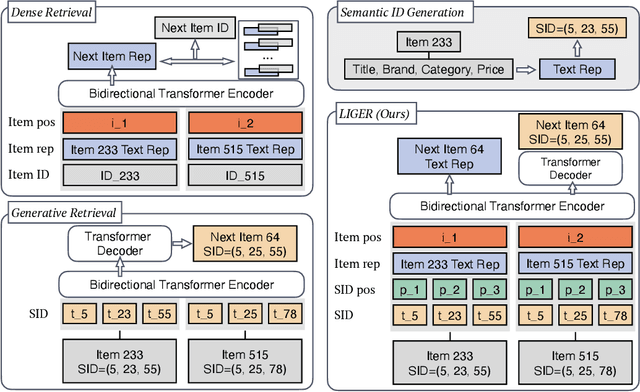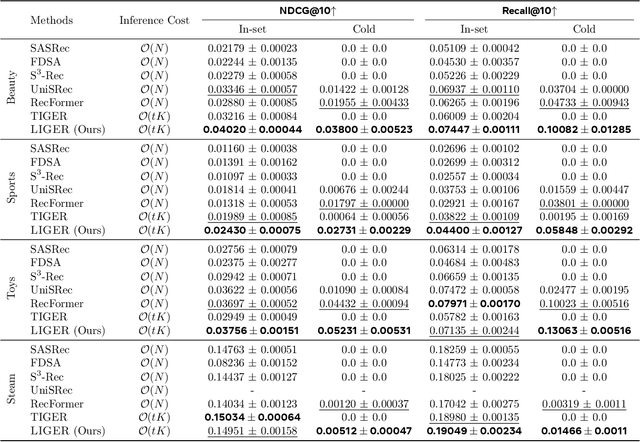Zhang Gabriel Li
Preference Discerning with LLM-Enhanced Generative Retrieval
Dec 11, 2024



Abstract:Sequential recommendation systems aim to provide personalized recommendations for users based on their interaction history. To achieve this, they often incorporate auxiliary information, such as textual descriptions of items and auxiliary tasks, like predicting user preferences and intent. Despite numerous efforts to enhance these models, they still suffer from limited personalization. To address this issue, we propose a new paradigm, which we term preference discerning. In preference dscerning, we explicitly condition a generative sequential recommendation system on user preferences within its context. To this end, we generate user preferences using Large Language Models (LLMs) based on user reviews and item-specific data. To evaluate preference discerning capabilities of sequential recommendation systems, we introduce a novel benchmark that provides a holistic evaluation across various scenarios, including preference steering and sentiment following. We assess current state-of-the-art methods using our benchmark and show that they struggle to accurately discern user preferences. Therefore, we propose a new method named Mender ($\textbf{M}$ultimodal Prefer$\textbf{en}$ce $\textbf{d}$iscern$\textbf{er}$), which improves upon existing methods and achieves state-of-the-art performance on our benchmark. Our results show that Mender can be effectively guided by human preferences even though they have not been observed during training, paving the way toward more personalized sequential recommendation systems. We will open-source the code and benchmarks upon publication.
Unifying Generative and Dense Retrieval for Sequential Recommendation
Nov 27, 2024



Abstract:Sequential dense retrieval models utilize advanced sequence learning techniques to compute item and user representations, which are then used to rank relevant items for a user through inner product computation between the user and all item representations. However, this approach requires storing a unique representation for each item, resulting in significant memory requirements as the number of items grow. In contrast, the recently proposed generative retrieval paradigm offers a promising alternative by directly predicting item indices using a generative model trained on semantic IDs that encapsulate items' semantic information. Despite its potential for large-scale applications, a comprehensive comparison between generative retrieval and sequential dense retrieval under fair conditions is still lacking, leaving open questions regarding performance, and computation trade-offs. To address this, we compare these two approaches under controlled conditions on academic benchmarks and propose LIGER (LeveragIng dense retrieval for GEnerative Retrieval), a hybrid model that combines the strengths of these two widely used methods. LIGER integrates sequential dense retrieval into generative retrieval, mitigating performance differences and enhancing cold-start item recommendation in the datasets evaluated. This hybrid approach provides insights into the trade-offs between these approaches and demonstrates improvements in efficiency and effectiveness for recommendation systems in small-scale benchmarks.
 Add to Chrome
Add to Chrome Add to Firefox
Add to Firefox Add to Edge
Add to Edge